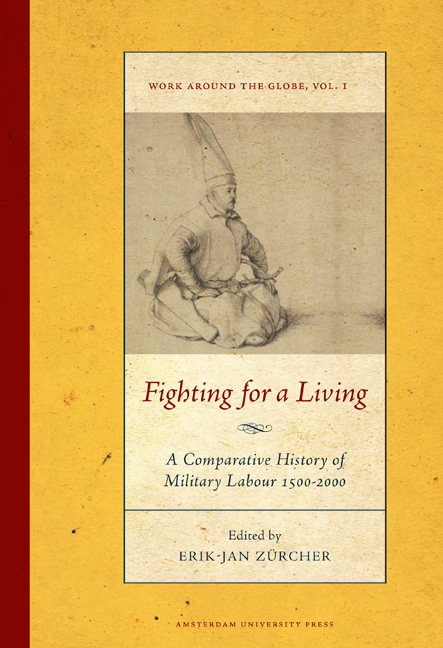Book contents
- Frontmatter
- Dedication
- Contents
- Preface
- Introduction: Understanding Changes in Military Recruitment and Employment Worldwide
- Military Labor in China, c. 1500
- From the Mamluks to the Mansabdars: A Social History of Military Service in South Asia, c. 1500 to c. 1650
- On the Ottoman Janissaries (Fourteenth-nineteenth Centuries)
- Soldiers in Western Europe, c. 1500-17901
- The Scottish Mercenary as a Migrant Labourer in Europe, 1550-1650
- Change and Continuity in Mercenary Armies: Central Europe, 1650-1750
- Peasants Fighting for a Living in Early Modern North India
- “True to Their Salt”: Mechanisms for Recruiting and Managing Military Labour in the Army of the East India Company During the Carnatic Wars in India
- “The Scum of Every County, the Refuse of Mankind”: Recruiting the British Army in the Eighteenth Century
- Mobilization of Warrior Populations in the Ottoman Context, 1750-1850
- Military Employment in Qing Dynasty China
- Military Service and the Russian Social Order, 1649-1861
- The French army, 1789-1914: Volunteers, Pressed Soldiers, and Conscripts
- The Dutch Army in Transition: From All-volunteer Force to Cadre-militia Army, 1795-1830
- The Draft and Draftees in Italy, 1861-1914
- Nation-building, War Experiences, and European Models: The Rejection of Conscription in Britain
- Mobilizing Military Labor in the Age of Total War: Ottoman Conscription Before and During the Great War
- Soldiering as Work: The All-volunteer Force in the United States
- Private Contractors in War From the 1990s to the Present: A Review Essay
- Collective Bibliography
- Notes on Contributors
The Scottish Mercenary as a Migrant Labourer in Europe, 1550-1650
Published online by Cambridge University Press: 12 December 2020
- Frontmatter
- Dedication
- Contents
- Preface
- Introduction: Understanding Changes in Military Recruitment and Employment Worldwide
- Military Labor in China, c. 1500
- From the Mamluks to the Mansabdars: A Social History of Military Service in South Asia, c. 1500 to c. 1650
- On the Ottoman Janissaries (Fourteenth-nineteenth Centuries)
- Soldiers in Western Europe, c. 1500-17901
- The Scottish Mercenary as a Migrant Labourer in Europe, 1550-1650
- Change and Continuity in Mercenary Armies: Central Europe, 1650-1750
- Peasants Fighting for a Living in Early Modern North India
- “True to Their Salt”: Mechanisms for Recruiting and Managing Military Labour in the Army of the East India Company During the Carnatic Wars in India
- “The Scum of Every County, the Refuse of Mankind”: Recruiting the British Army in the Eighteenth Century
- Mobilization of Warrior Populations in the Ottoman Context, 1750-1850
- Military Employment in Qing Dynasty China
- Military Service and the Russian Social Order, 1649-1861
- The French army, 1789-1914: Volunteers, Pressed Soldiers, and Conscripts
- The Dutch Army in Transition: From All-volunteer Force to Cadre-militia Army, 1795-1830
- The Draft and Draftees in Italy, 1861-1914
- Nation-building, War Experiences, and European Models: The Rejection of Conscription in Britain
- Mobilizing Military Labor in the Age of Total War: Ottoman Conscription Before and During the Great War
- Soldiering as Work: The All-volunteer Force in the United States
- Private Contractors in War From the 1990s to the Present: A Review Essay
- Collective Bibliography
- Notes on Contributors
Summary
Between 1550 and 1650 the government in Scotland, whether as the monarch or as the Privy Council acting in the royal name, permitted more than sixty levies of troops to fight in continental Europe. This occurred throughout the period of study but with peaks in the 1570s and the 1620s-1640s, corresponding with periods of fighting in the Low Countries and later in the Germanic lands in the Thirty Years War (1618-1648). This is summarized in Table 6.1. As the raising of soldiers to fight overseas also took place before and after these dates and as there were unofficial levies, despite attempts to stop them for fear of unrest or political embarrassment, the true extent of recruitment of men to fight overseas may never be fully known. The size of a licensed levy varied considerably, from as few as sixty men in the licences granted to Patrik Murray on 25 March 1602 for service in the Low Countries and to Thomas Moffat on 23 July 1635 for Swedish service in Prussia, to as many as several thousands. In at least some instances, for example for the 3,000 men each to Robert Earl of Nithsdale, Alexander Lord Spynie, and James Sinclair of Murkle on 3 April 1627 for Danish service, these ambitious targets were not reached; and in the case of others, for example to Robert Stewart for Poland in 1623, very little, if any, recruiting took place. The more usual figures mentioned in the licences are 200 or 300 men. With a proviso in mind about the accuracy and reliability of these figures, it has been estimated that during the Thirty Years War (1618-1648), when the recruitment of soldiers for overseas service was at its height, as many as 50,000 Scotsmen bore arms in European conflicts.
It can be argued that the term “mercenary” is not appropriate in describing these men. The term current in Scotland in the sixteenth and seventeenth centuries was the phrase “waged men of war” – in Scots, “wageit men of weare” or variants of it. “Mercenary” remains, however, a convenient word to describe the soldiers who were fighting for a commander or a political state other than that which from their place of birth or normal residence could be deemed their own, and it is used here in this sense.
- Type
- Chapter
- Information
- Fighting for a LivingA Comparative Study of Military Labour 1500–2000, pp. 169 - 200Publisher: Amsterdam University PressPrint publication year: 2013
- 1
- Cited by



